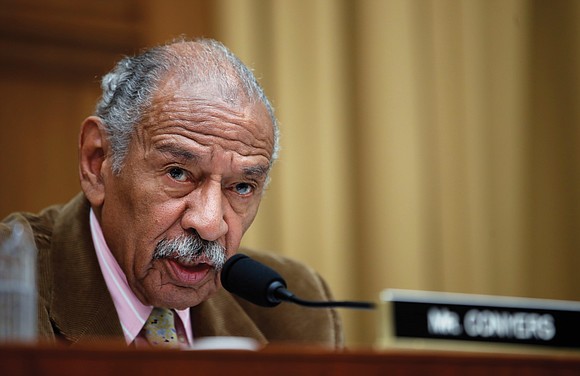Former Rep. John Conyers, the longest-serving black lawmaker in U.S. House of Representatives, dies at 90
Free Press wire reports | 10/31/2019, 6 p.m.
WASHINGTON Former Rep. John Conyers, a liberal Democrat who was the longest-serving African-American member of the U.S. House of Representatives at more than half a century, died on Sunday, Oct. 27, 2019, at the age of 90.
Rep. Conyers joined the House in 1965 and stepped down in 2017, after his reputation was sullied by sexual harassment accusations. The Detroit-area congressman was a founding member of the Congressional Black Caucus.
In a statement released by the CBC, officials said, “Congressman Conyers was more than a founding member. He was a guiding light. We will continue his vision by serving as the ‘Conscience of the Congress’ in pursuit of justice for all Americans.”
“I was deeply saddened by the passing of Congressman John Conyers today,” Detroit Mayor Mike Duggan said in a written statement released by his office.
“From co-founding the Congressional Black Caucus to leading the fight in Congress to enshrine Martin Luther King’s birthday as a national holiday, John Conyers’ impact on our city and nation will never be forgotten,” Mayor Duggan said.
Just days after Dr. King was assassinated in 1968, Rep. Conyers introduced legislation to create a federal holiday honoring the civil rights leader. He reintroduced the bill every year for 15 years until President Ronald Reagan signed the King Holiday into law in 1983.
Civil rights pioneer Rosa Parks, who famously refused to give up her seat to a white passenger on a Montgomery, Ala., bus in 1955, worked on his Detroit staff for more than two decades before retiring in 1988.
He was a lead co-sponsor of the Voting Rights Act of 1965. He also was an ardent opponent of the death penalty and fought for Justice Department oversight in cases of police brutality.
According to the CBC, Rep. Conyers was the first member of Congress to introduce the Expanded and Improved Medicare for All Act to establish a government-sponsored, single payer health system option to control costs.
He also was a champion of the issue of reparations for descendants of formerly enslaved people in the United States, and introduced a bill to establish a commission to study the issue of slavery and race relations.
“His fight for justice extended to international issues as well,” the CBC stated. “Mr. Conyers was an early leader in the anti-Vietnam War movement, in addition to the anti-Iraq War movement. He was also a vocal opponent of South Africa’s apartheid policies,” joining the late Congressman Ron Dellums of California and other CBC members in confronting President Nixon about imposing sanctions against South Africa.
“When it became clear (President Nixon) would not act, Congressman Conyers joined Congressman Dellums in intro- ducing legislation to that end and was even arrested at a protest in front of the South African embassy,” the CBC stated.
In November 2017, the House Ethics Committee said it was investigating allegations of sexual harassment against Rep. Conyers, who said his office had resolved a harassment case with a payment but no admission of guilt.
The allegations arose as Congress reviewed how to handle sexual harassment complaints and followed a string of similar accusations against prominent figures in the U.S. media, Hol- lywood and politics.
Rep.Conyers stepped down on Dec. 5, 2017, although saying the harassment allegations were “not true.”
He was chair of two influential committees — the House Government Oversight and Reform Committee and the House Judiciary Committee, of which he was the first African-American chairman, although a criminal case involving his wife caused him embarrassment at the time.
Monica Conyers, a former Detroit city councilwoman, was sentenced in 2010 to 37 months in prison for accepting bribes from a waste management company trying to win city business. The U.S. Justice Department said there was no evidence the congressman knew about his wife’s conduct.
Rep. Conyers led the 1989 impeachment and removal of a black federal judge, Alcee Hastings of Florida, for corruption. Judge Hastings later was elected to the U.S. House of Representatives.
First elected to the House in 1964, Rep. Conyers was the only House member to serve on two committees handling presidential impeachments: for Republican Richard Nixon in 1974 over the Watergate scandal and for Democrat Bill Clinton in 1998 over his relationship with a female White House intern.
Rep. Conyers favored the impeachment of President Nixon, who became the only president to resign, and was included on President Nixon’s infamous “enemies list.”
He fought against the impeachment of President Clinton, calling it a coup attempt by Republicans. The Senate ultimately declined to remove President Clinton from office.
He also investigated the 2004 U.S. presidential election in which President George W. Bush edged Democrat John Kerry, with President Bush’s narrow victory in Ohio proving pivotal. Rep. Conyers’ report said that “numerous serious election irregularities” and Republican misconduct tilted Ohio to President Bush.
Critics felt the Detroit native and son of an autoworkers’ union official was, as writer Joe Klein put it in Time magazine, “foolishly incendiary.” Supporters felt otherwise. Marcus Raskin of the Institute for Policy Studies think tank told Newhouse News Service in 2006: “He’s a cannon but he’s not loose.”
In 1989 and 1993, Rep. Conyers ran for mayor of Detroit but lost.







